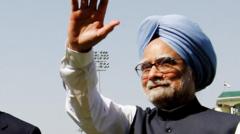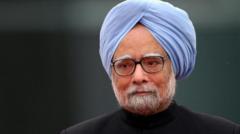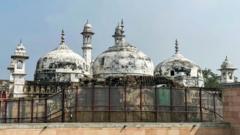In remembrance of Manmohan Singh, we explore his revolutionary impact on India's economy and his legacy in fostering international relations.
**Manmohan Singh: A Visionary Leader Who Transformed India's Economy Dies at 92**

**Manmohan Singh: A Visionary Leader Who Transformed India's Economy Dies at 92**
A respected statesman, Singh’s free-market reforms positioned India as an economic contender on the global stage.
Manmohan Singh, the renowned former Prime Minister of India, passed away on Thursday at the age of 92 in New Delhi. His death, confirmed by the All India Institute of Medical Sciences, marks the end of a significant era in Indian politics. Prime Minister Narendra Modi acknowledged Singh's profound contributions, referring to him as one of the nation's "most distinguished leaders."
As India's first Sikh Prime Minister, Singh served from 2004 to 2014, and is particularly noted for his role in introducing substantial economic reforms. Born in a region that is now part of Pakistan, Singh experienced the transformative yet tumultuous period following the country's partition in 1947. These early experiences shaped his commitment to unity and economic development, especially in a nation riddled with complex ethnic and religious dynamics.
Singh initially gained prominence in 1991, during his tenure as Finance Minister, where he was instrumental in liberalizing India's economy. His policies initiated a paradigm shift, paving the way for private enterprise and attracting foreign investment, which helped transform India into a rapidly emerging market capable of competing with global giants like China.
Despite his groundbreaking achievements, Singh's time in office was also marred by political challenges, including several corruption scandals that tainted his administration's image. Furthermore, his subdued demeanor and infrequent media engagement contributed to a perception of detachment, even as the nation reaped the benefits of his economic strategies.
Singh's legacy is multifaceted; he not only helped elevate India's economic status but also sought to improve relations with neighboring Pakistan, underscoring his vision of a more collaborative South Asia. The response to his death reflects a recognition of his complex contributions, as both an architect of growth and a leader navigating the intricate politics of India.
As the nation mourns his passing, many are left to ponder the future of India in the wake of his significant yet controversial legacy.
As India's first Sikh Prime Minister, Singh served from 2004 to 2014, and is particularly noted for his role in introducing substantial economic reforms. Born in a region that is now part of Pakistan, Singh experienced the transformative yet tumultuous period following the country's partition in 1947. These early experiences shaped his commitment to unity and economic development, especially in a nation riddled with complex ethnic and religious dynamics.
Singh initially gained prominence in 1991, during his tenure as Finance Minister, where he was instrumental in liberalizing India's economy. His policies initiated a paradigm shift, paving the way for private enterprise and attracting foreign investment, which helped transform India into a rapidly emerging market capable of competing with global giants like China.
Despite his groundbreaking achievements, Singh's time in office was also marred by political challenges, including several corruption scandals that tainted his administration's image. Furthermore, his subdued demeanor and infrequent media engagement contributed to a perception of detachment, even as the nation reaped the benefits of his economic strategies.
Singh's legacy is multifaceted; he not only helped elevate India's economic status but also sought to improve relations with neighboring Pakistan, underscoring his vision of a more collaborative South Asia. The response to his death reflects a recognition of his complex contributions, as both an architect of growth and a leader navigating the intricate politics of India.
As the nation mourns his passing, many are left to ponder the future of India in the wake of his significant yet controversial legacy.




















